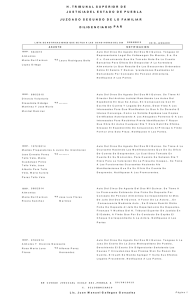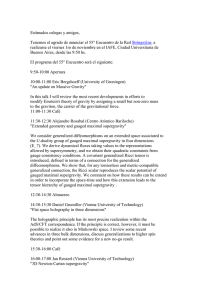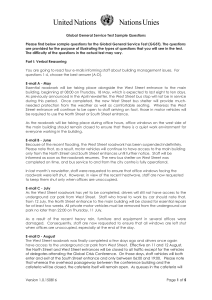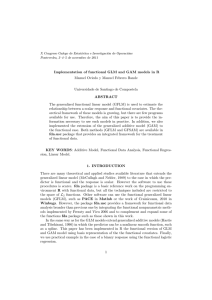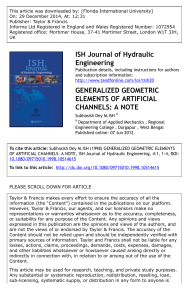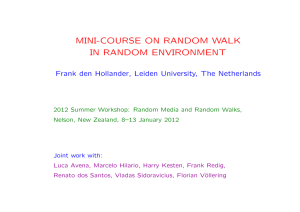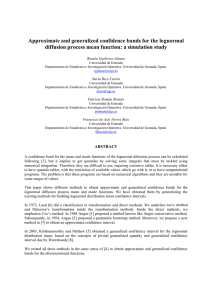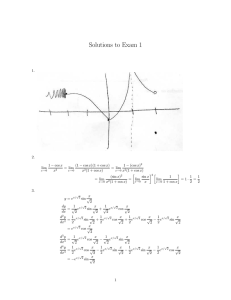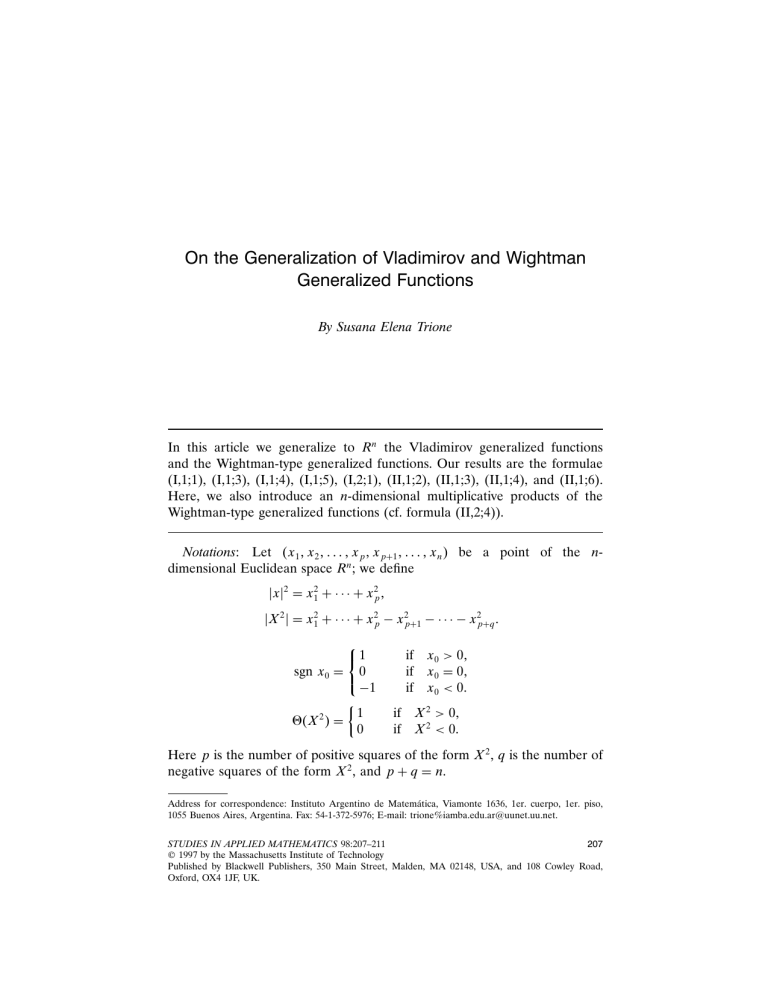
On the Generalization of Vladimirov and Wightman Generalized Functions By Susana Elena Trione In this article we generalize to Rn the Vladimirov generalized functions and the Wightman-type generalized functions. Our results are the formulae (I,1;1), (I,1;3), (I,1;4), (I,1;5), (I,2;1), (II,1;2), (II,1;3), (II,1;4), and (II,1;6). Here, we also introduce an n-dimensional multiplicative products of the Wightman-type generalized functions (cf. formula (II,2;4)). Notations: Let x1 ; x2 ; : : : ; xp ; xp+1 ; : : : ; xn be a point of the ndimensional Euclidean space Rn ; we define x2 = x21 + · · · + x2p ; X 2 = x21 + · · · + x2p − x2p+1 − · · · − x2p+q : 1 sgn x0 = 0 −1 1 2X 2 = 0 if x0 > 0; if x0 = 0; if x0 < 0: if X 2 > 0; if X 2 < 0: Here p is the number of positive squares of the form X 2 , q is the number of negative squares of the form X 2 , and p + q = n. Address for correspondence: Instituto Argentino de Matemática, Viamonte 1636, 1er. cuerpo, 1er. piso, 1055 Buenos Aires, Argentina. Fax: 54-1-372-5976; E-mail: trione%[email protected]. STUDIES IN APPLIED MATHEMATICS 98:207–211 207 © 1997 by the Massachusetts Institute of Technology Published by Blackwell Publishers, 350 Main Street, Malden, MA 02148, USA, and 108 Cowley Road, Oxford, OX4 1JF, UK. 208 Susana Elena Trione I.1. We define the following generalized function: lim x2 − xp+1 + iε2 − xp+2 + iε2 − · · · − xn + iε2 ε→+0 −s/2 = x2 − xp+1 + i02 − xp+2 + i02 − · · · − xn + i02 −s/2 ; s = 0; ±1; ±2; : : : : (I,1;1) If s ≤ 1, this generalized function is a locally integrable function of power increase at infinite and it may be evaluated without difficulty. It is clear that −s/2 lim x2 − xp+1 + iε2 − · · · − xn + iε2 ε→0 = lim x2 − xp+1 + iε2 + · · · + xn + iε2 ε→0 = lim x2 − x2p+1 + 2xp+1 εi + iε2 + · · · ε→0 + xn + 2xn εi + iε2 −s/2 −s/2 = lim x2 − x2p+1 − · · · − x2n + qiε2 ε→0 + 2iεxp+1 + · · · + xn −s/2 : (I,1;2) If s = 1, we have lim x2 − xp+1 + iε2 − · · · − xn + iε2 ε→0 −1/2 = x2 − xp+1 + i02 + · · · + xn + i02 −1/2 = 2X 2 X 2 −1/2 + i sgn xp+1 + · · · + xn · 2−X 2 −X 2 −1/2 : (I,1;3) If s = 2k + 1, k = 1; 2; : : : ; taking into account (I,1;2), we obtain 2 −k−1/2 x − xp+1 + i02 − · · · − xn + i02 = 2X 2 X 2 −k−1/2 + i−1k sgn xp+1 + · · · + xn · 2−X 2 −X 2 −k−1/2 : If s = 2k, k = 0; 1; : : : ; from (I,1;2) we get 2 x − xp+1 + i02 − · · · − xn + i02 = (I,1;4) −k iπ sgn xp+1 + · · · + xn δk−1 X 2 k − 1 ! + −1k Pf 1 y X 2 k where Pf indicates, as usual, the finite part. (I,1;5) Vladimirov and Wightman Generalized Functions 209 The formula (I,1;5) can be obtained in the same manner as we proved the formula (I,13;21), [1, p. 59]. I.2. We define the following generalized function: lim ln x2 − xp+1 + iε2 − · · · − xn + iε2 ε→+0 = ln x2 − xp+1 + i02 − · · · − xn + i02 (I,2;1) = ln X2 + iπ sgn xp+1 + · · · + xn 2X 2 : Remark: We note that if X 2 = x21 + x22 + · · · + x2n−1 − x20 , the generalized functions (I,1;4), (I,1;5), and (I,2;1) are the Vladimirov generalized functions (cf. [2, pp. 298, 299, formulae (133), (136), and (138)]). Notations: Let x = xν = x0 ; X, X = x1 ; x2 ; : : : ; xn−1 be a point of the n-dimensional Minkowski space of real numbers, with x2 = x2ν = x20 − X 2 ; X2 = n−1 X x2i : i=1 II.1. We define the Wightman-type generalized functions x2 ∓ ix0 0λ for Re λ > 0 by the following formulas def x2 − ix0 0λ = lim e−iπλ X 2 − x0 − iε2 λ ε→0 (II,1;1) = e−iπλ eiπλ 2x0 x2 + e−iπλ 2−x0 x2 + 2−x20 X 2 λ ; (II,1;2) and def x2 + ix0 0λ = x2 − ix0 0λ : (II,1;3) We observe that in the formula (II,1;2) the poles cancel and therefore x2 ∓ ix0 0λ are analytic in all λ-complex plane. For λ = −n, we obtain x2 ∓ ix0 0−n = x2 −n ± + iπ−1n−1 εx0 δn−1 x2 n − 1 ! π3 2n−3 n n−2 δx ; − 1 ! n − 2 ! where we have written, by definition, εx0 δ x2 = 2x0 δ x2 − 2−x0 δ x2 ; (II,1;4) 210 Susana Elena Trione and = p X x2i − i=1 n X x2i : (II,1;5) i=p+1 We also have x2 − ix0 0−n − x2 + ix0 0−n = 2πi−1n−1 εx0 δn−1 x2 : n − 1 ! (II,1;6) The present formulae are defined for the four-dimensional real Minkowski space in [3, Sect. 6.2]. II.2. In [4, p. 398, formula (3.5)], Güttinger and Pfaffelhuber say textually: “Products of generalized functions x2 − ix0 λ are defined by x2 − ix0 0λ · x2 − ix0 0µ = x2 − ix0 0λ+µ :” (II,2;1) In this paragraph we generalize the four-dimensional multiplicative product (II,2;1) and also we justify that product by means of the method used in [1, Sect. I.3]. We begin by proving the formulae (I,2;1) in the bidimensional space; it is x1 − ix0 0λ · x1 − ix0 0µ : (II,2;2) Taking into account the definitory formula (II,1;1) we approximate both terms of (II,2;2), respectively, by the smooth functions, of identical structure, X 2 − x0 − iε2 λ and X 2 − x0 − iε2 µ and define (first for Re λ > 0, Re µ > 0, and then, by analytical continuation, for every λ, µ ∈ C) x21 − ix0 0λ · x21 − ix0 0µ def = lim e−iπλ x21 − x0 − iε2 λ · e−iπµ x1 − x0 − iε2 µ ε→0 = lim e−iπλ+µ x21 − x0 − iε2 λ+µ ε→0 def = x21 − x0 − i02 λ+µ : (II,2;3) We remark that it can be shown that our definition (II,2;3) is intimately related with the method used by Antosik et al. [5] to define the multiplicative product of two generalized functions. The following proposition is a multidimensional analogue of (II,2;3). Theorem. The following formula is true for λ, µ ∈ C: x2 ∓ ix0 0λ · x2 ∓ ix0 0µ = x2 ∓ ix0 0λ+µ ; (II,2;4) where x ∈ Rn and x2 ∓ ix0 0r are defined by (II,1;2) and (II,1;3), respectively. Proof : It is identical “mutatis mutandis” with our proof of (II,2;3) and therefore we omit it. Vladimirov and Wightman Generalized Functions 211 References 1. S. E. Trione, Distributional Products, Cursos de Matemática, No. 3, IAM, CONICET, Buenos Aires, 1980. 2. V. S. Vladimirov, Methods of the Theory of Functions of Many Complex Variables, MIT Press, Cambridge, MA, 1966. 3. A. Rieckers and W. Güttinger, Spectral representations of Lorentz invariant distributions and scale transformation, Commun. Math. Phys. 7:190–217(1968). 4. W. Güttinger and E. Pfaffelhuber, Dynamics of Unrenormalizable Interactions in Minkowski and Euclidean Spaces, Vol. LII A, No. 2, Il Nuovo Cimento, 1967. 5. P. Antosik, J. Mikusiński, and R. Sikorski, Theory of Distributions: The Sequential Approach, Amsterdam/Warszawa, 1973. Universidad de Buenos Aires, Argentina (Received December 21, 1995)
